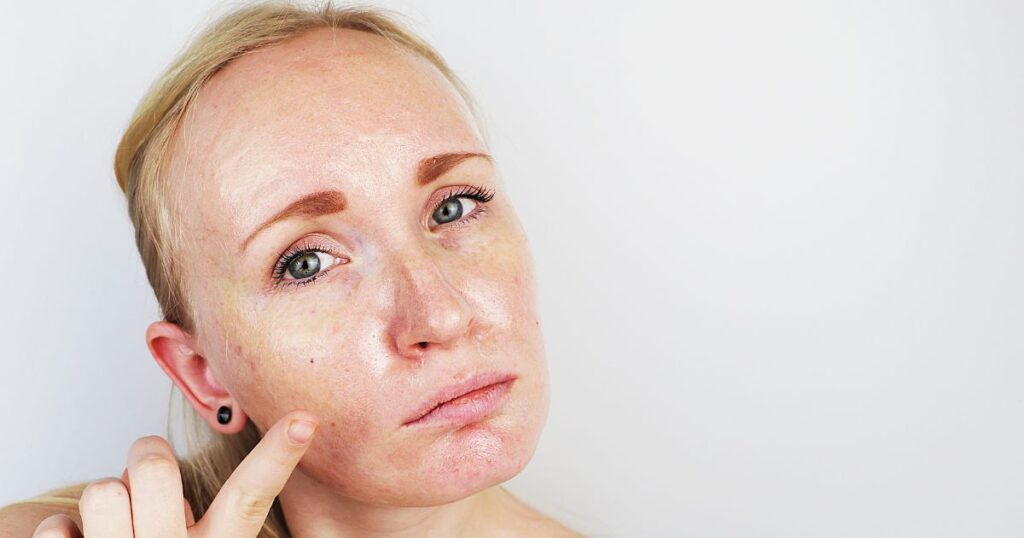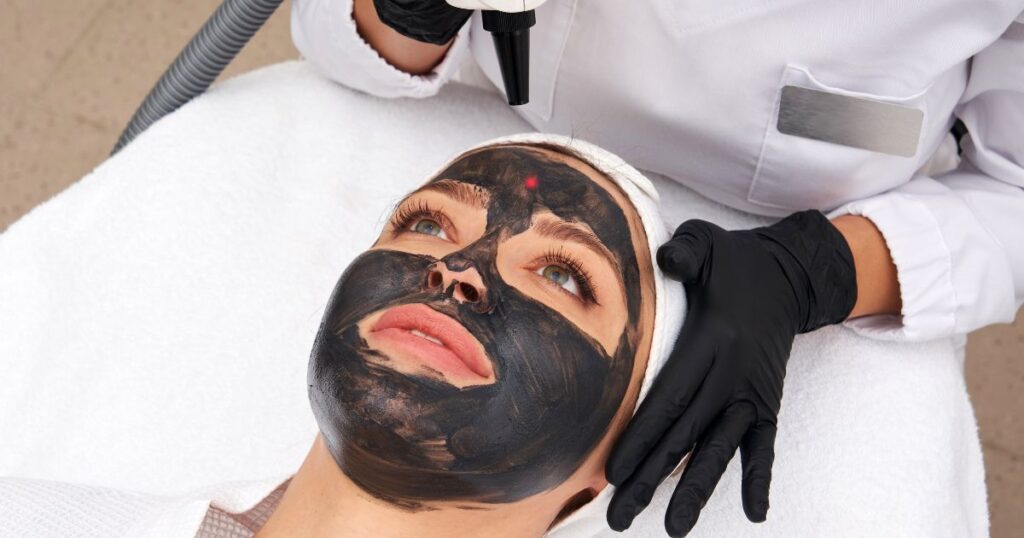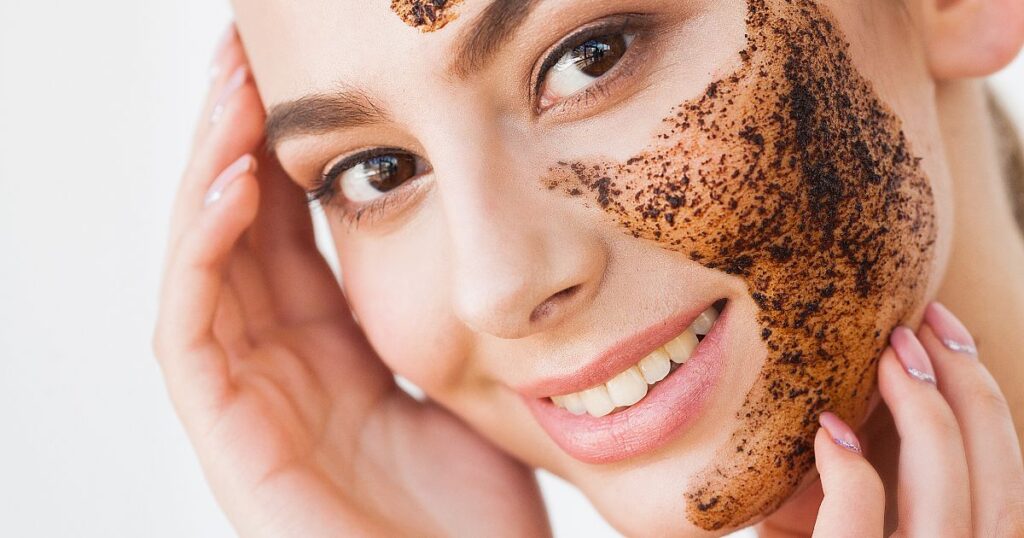Activated charcoal products have become popular in the clean beauty industry, capturing the attention of skincare enthusiasts with their bold claims and striking black appearance.
But behind the hype, what real benefits does activated charcoal offer when applied topically? We’ll explain the role of activated charcoal in skincare, evaluating its effectiveness and safety through a critical lens.
Table of Contents - Click to Go
What’s All The Hype Around Activated Charcoal? Separating Fact from Fiction
Activated charcoal has surged in popularity within the clean beauty industry, due to its dramatic claims of detoxification and skin purification.
Let’s break down the claims and the real effects:
- Detoxifying Claims: Brands promote activated charcoal as a powerhouse capable of removing toxins and impurities from the skin.
- Purifying Effects: It’s often stated that activated charcoal works to clear skin pores and reduce acne by absorbing excess oils.
Reality Check:
- Scientific Evidence: Research on activated charcoal in skincare is limited. Studies that do exist are inconclusive or show that benefits are often overstated.
- Expert Opinions: Dermatologists and skincare experts suggest that while activated charcoal can help to some extent, it’s usually the combination of ingredients in charcoal-infused products that leads to skin improvements.
- These might include:
- Clays: Help in drawing out oils and impurities.
- Acids: Contribute to skin renewal and exfoliation.
- These might include:
Contributing Factors to the Hype:
- Marketing Influence: The dramatic color and texture of activated charcoal make it a popular choice for marketing narratives.
- Visual Appeal: Its unique appearance in products appeals visually, enhancing its perceived effectiveness.
Safety Tips For Using Activated Charcoal for Skincare

Here are some safety tips for incorporating activated charcoal into your skincare routine:
- Potential Irritation: Charcoal’s gritty texture can be harsh, particularly in scrub formulations.
- Risk of Abrasiveness: Scrubs with activated charcoal may cause micro-tears in the skin if used too vigorously or too often.
Dermatologist Recommendations:
- Gentle Use: Apply charcoal products lightly, without excessive rubbing or pressure, especially if you have sensitive skin.
- Frequency of Use: Limit the use of activated charcoal treatment scrubs to once or twice a week to prevent skin damage.
Choosing the Right Product:
- Formulation Matters: Opt for products where charcoal is balanced with soothing and hydrating ingredients to mitigate any potential harshness. These might include:
- Aloe vera: Soothes and moisturizes the skin.
- Hyaluronic acid: Helps retain skin moisture and reduces irritation risks.
- Patch Testing: Always perform a patch test before fully integrating a new charcoal product into your skincare regimen to check for any adverse reactions.
For Sensitive Skin:
- Avoid Harsh Mixtures: If your skin is prone to irritation, steer clear of charcoal-based scrubs and opt for gentler formulations like masks or cleansers.
- Consultation: Consider consulting with a dermatologist before starting new treatments involving active ingredients like charcoal, especially if you have pre-existing skin conditions.
How Much Activated Charcoal Should You Use?
Determining the right amount and frequency of activated charcoal use in your skincare routine is crucial for maximizing benefits while minimizing potential side effects.
Here’s a guide on how to effectively incorporate charcoal into your skincare without overdoing it.
Product Type Matters:
- Scrubs: Due to their abrasive nature, charcoal scrubs should be used sparingly. Limit their use to once or twice a week to avoid over-exfoliating, which can strip the skin of essential oils and weaken its barrier.
- Cleansers and Masks: Charcoal cleansers and masks are gentler on the skin compared to scrubs. These can be used more frequently, about 2-3 times a week, depending on your skin type and needs.
Moderation Is Key:
The allure of quick results might tempt you to use charcoal products more frequently, but overuse can lead to dryness and irritation, especially for those with sensitive skin. It’s important to start slow and observe how your skin responds before making charcoal a regular part of your skincare regimen.
Adjust According to Skin Response:
- Listen to your skin: If you notice dryness or irritation, reduce the frequency of charcoal application.
- Tailor to your skin type: Oily and acne-prone skin might benefit from slightly more frequent use, while dry or sensitive skin types should be more cautious.
Consult with a Professional:
If you are unsure about how much activated charcoal your skin can handle, it’s wise to consult with a dermatologist. They can provide personalized advice based on your skin’s specific conditions and needs.
What Skin Types Benefit Most From Activated Charcoal?

Ideal for Oily and Acne-Prone Skin:
- Absorbs Excess Oil: Activated charcoal is excellent at soaking up excess sebum and oils on the skin’s surface, which can help prevent acne breakouts.
- Unclogs Pores: By drawing out dirt and impurities from the pores, activated charcoal can reduce blackheads and promote a clearer complexion.
Considerations for Dry or Sensitive Skin:
- While activated charcoal is beneficial for oily skin, it can be too drying for those with dry or sensitive skin types. If your skin falls into these categories, it’s important to:
- Use charcoal-infused products less frequently.
- Choose products that combine charcoal with moisturizing ingredients to counteract potential dryness.
Testing for Compatibility:
- Patch Test: Always conduct a patch test before incorporating a new charcoal product into your routine, especially if you have sensitive skin.
- Monitor Skin’s Response: Pay close attention to how your skin reacts after using charcoal products. Any signs of irritation or dryness might indicate that the product is not suitable for your skin type.
Expert Advice:
Consulting with a skincare professional or dermatologist can provide further guidance on whether activated charcoal is appropriate for your skin type and how to incorporate it safely into your skincare routine.
Regulation and Marketing Claims: What You Need to Know

Navigating the world of skincare products, particularly those containing activated charcoal, requires an understanding of the regulatory framework and marketing claims. This knowledge can help consumers make informed decisions and select products that are both effective and safe.
Regulatory Landscape:
- Cosmetic Classification: In many regions, activated charcoal skincare products are classified as cosmetics, not as drugs. This classification means that while they are regulated for safety, the regulations regarding efficacy claims are less stringent.
- FDA Oversight: For U.S. consumers, the Food and Drug Administration (FDA) does not require cosmetic products and ingredients, other than color additives, to have FDA approval before they go on the market. Companies are responsible for ensuring the safety of their products.
Evaluating Marketing Claims:
- Look for Substantiation: Many products with activated charcoal claim to “detoxify” the skin, but these claims are often not supported by robust scientific evidence. It’s important for consumers to look for claims that are substantiated by actual data or studies.
- Be Skeptical of Overstated Benefits: Products that promise miraculous results should be approached with skepticism. Effective skincare is usually the result of consistent care and the use of products suited to one’s skin type and concerns.
Consumer Tips:
- Read Ingredient Labels: Understanding the full list of ingredients can provide insights into a product’s potential effectiveness and safety.
- Research: Look up product reviews and studies if available. This can provide a broader perspective on the effectiveness of activated charcoal in skincare.
- Consult Professionals: When in doubt, consulting with skincare professionals or dermatologists can provide guidance tailored to individual skin needs.
Use Activated Charcoal Products Sparingly In Your Clean Beauty Skincare Routine

While activated charcoal does hold some benefits, particularly for those with oily and acne-prone skin, the broad claims of detoxification and miraculous transformations often stem more from marketing strategies than solid scientific evidence. As we’ve seen, the effectiveness of charcoal-infused products frequently relies on the combination of multiple ingredients rather than charcoal alone.
We encourage readers to maintain a balanced view of activated charcoal in skincare, appreciating the benefits it can offer while remaining critical of lofty claims. By doing so, you can integrate this ingredient into your skincare routine in a way that is both safe and effective.
- Informed Usage: It’s crucial for consumers to approach charcoal skincare products with a well-informed mindset, recognizing both the potential advantages and the limitations.
- Safety and Moderation: Considering the safety guidelines, such as using products sparingly and choosing formulations appropriate for your skin type, is essential to prevent potential irritation.
- Regulatory Insights: Understanding that these products are lightly regulated can guide consumers in making more cautious and researched purchasing decisions.
